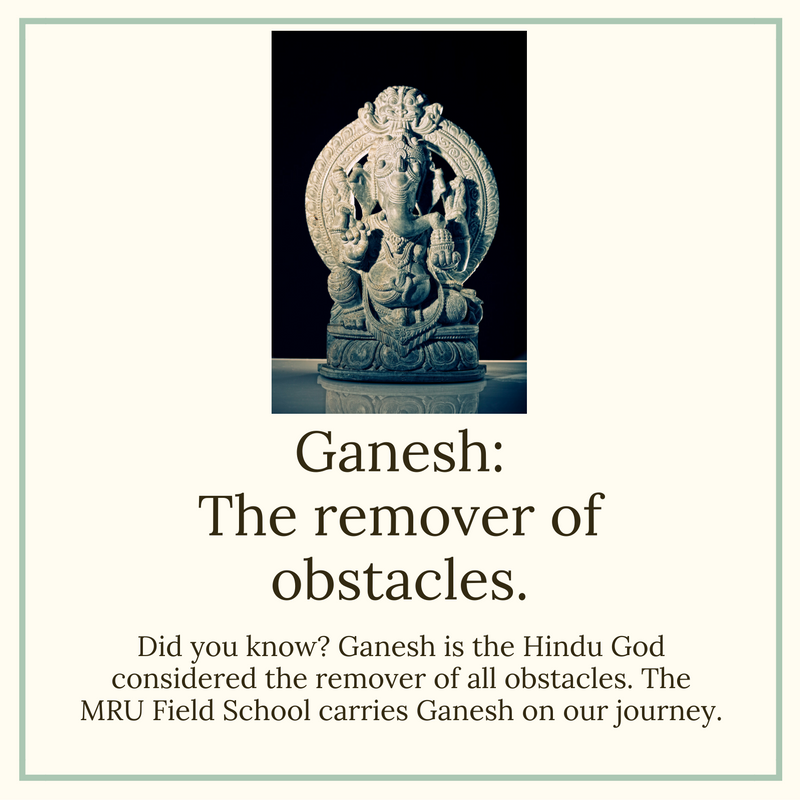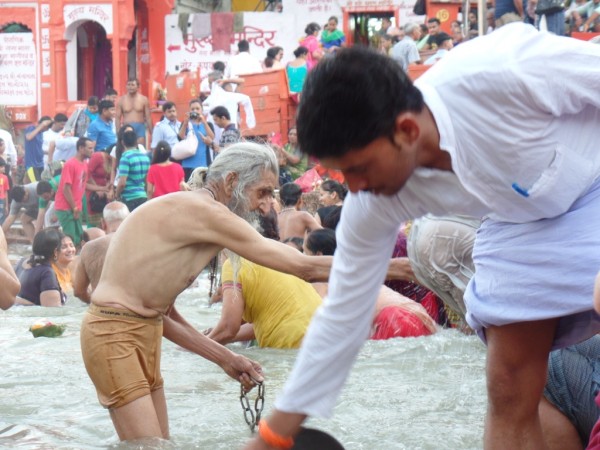Connecting on a personal level
You have already demonstrated a level of engagement by accepting a seat in the field school program. We are about to embark on an adventure that will be full of great moments but will also present each of us – professors included – with routine challenges. It is important to consider some of those challenges now, as we get ready to, go so that each of you has a chance to reflect on the road ahead. We will all be pulled from our comfort zones and will at times feel anxious, or challenged, or discouraged, or in need of a break from the group, or just plain tired. Personal engagement on this level also involves making a commitment to self-care. 
Goal setting
Demonstrating engagement and leadership can also be achieved through active goal setting. We think that each of you should take a few minutes to think about and capture one or more personal goals you will pursue as part of India 2016. These goals can be academic, professional or personal. These goals can change as your India 2018 experience evolves. There is no rulebook for identifying and acting on your goals. It can be done in a range of ways. But, the act of listing your goals, and thinking about how you will accomplish those goals during the field school, will enrich the experience by keeping you focused, motivated and providing a way to measure success. A chart such as this example below can be helpful. Create something in a place where you can routinely update, such as your phone, your laptop, or a journal.
| Academic goals | Steps to achieve goals |
| Preparing for graduation | |
| Preparing for future post-secondary goals | |
| Professional goals | Steps to achieve goals |
| Active practice in my discipline | |
| Professional engagement with communities visited | |
| Personal goals | Steps to achieve goals |
| Better understand an ancient culture | |
| Challenge myself |
Experiencing a new culture
Culture shock is a catch-all phrase to describe the anxiety we often feel when traveling to unfamiliar places and being exposed to new cultures. You might feel tired, disorientated, annoyed, homesick etc. It is important to understand that these feelings are a normal response to the challenges of being away from home, and being subject to information overload, adjustment to new foods, sleeping in new places, being with a group of people 24/7, and dealing with a different climate. Here is a list of concerns expressed by former India field-schoolers when asked in advance of their trip what worried them most about going to India.
Those worries are in bold below. We then asked them after their trip whether their concerns were valid or not based on having been in India. Those responses follow the bolded text.
Safety – a concern but didn’t feel unsafe at all during trip
Staying at Ashram – but no need to be concerned
Culture shock – it is real, but overcame it through group interaction
Poverty – it was difficult to see, but wasn’t as much of a concern as expected
Being homesick – it happens but nothing to be afraid of
Food – valid concern, big change in diet and adjusting to food is a challenge
Physical challenges – busy trip and easy to get tired; can get hot
Ability to immerse oneself in culture – not a valid concern
Group travel – some cliques developed; felt judged by others; inner shyness
Functioning properly in new culture – valid concern; needed time to process the experience; tiring at times; language barriers
Group work – not a valid concern; smaller work groups were fun
Being a ‘princess’ – not valid; students were able to adjust to the conditions
You can see that for the most part the field-schoolers generally adapted better to being in India than they thought would be the case. Even so, it is normal to have concerns either in advance of the field school or during.
Being calm
Is a normal sensation under the circumstances, and one that we all share at one point or another and in different ways based on our previous experiences abroad, and our personal expectations and wishes. When feeling anxious there are a few concrete steps you might take.
Talk to someone in the group about it. Not the whole group but one other group member you are comfortable with.
Take a break. It is ok to want to take some time alone, or to sit quietly on a train or bus ride and not feel as if you need interact.
Write some postcards for friends at home. Not an email, or a text, but a postcard, and share an experience you had and mail it to them.
Keep a journal. This is a great way to process your day, and examine your feelings. Journaling can be useful to you in completing your final assignment in COMM 3501. Your journal is private and for your eyes only, but you might want to share elements of it in your essay.
Previous field-schoolers were advised to keep journals, and a few of them did. When asked on a questionnaire after the trip what advice they would offer the 2016 group the majority suggested keeping a daily journal. Others suggested having a comfort snack – something from home you really like such as small bags of M&Ms. Other suggestions included bringing a comfort book to read; a favourite that you have read before and enjoyed.
Checking in at home is great in the evenings, but overdoing it can increase your anxiety. When away from home, be away from home. Drink water routinely and take electrolytes (more details in the packing section of the guide). It might sound funny now, but if you get dehydrated you won’t feel well and that can make you anxious about your surroundings. These tips are easy to accommodate even with the busy schedule we will have in India.
Considerations of spirituality
In preparation for field school, we asked the chaplain at MRU to connect with you. Here is the note.
Greetings from Mount Royal’s Multi-faith Chaplaincy
“It is with great enthusiasm and joy that we send off our Mount Royal students on what will be a truly unique adventure. Our world is diverse and pluralistic. And it is beautiful. We see diversity as an opportunity to embrace the other where we are similar, and to grow as we learn and celebrate our differences. We want to encourage you to immerse yourselves in a new environment. Undoubtedly, you may learn more about new beliefs, traditions, and religions than your own tradition. Know that this does not devalue your own beliefs. In fact, we hope this is an opportunity to deepen your own beliefs, while setting a new precedent for a diverse and multi-cultural society that is based on friendship, understanding, and love of for the other. May you be encouraged to gain new understandings of other cultures, beliefs, and traditions by seeking authentic relationships. May you open your heart to the stranger and cherish their stories. May you seek beauty instead of conflict, and learning instead of the status quo. And may you come home with a deeper sense of yourself, your beliefs, and seek to share what you have learned with the rest of Mount Royal University. Best wishes and safe travels, The Multi-faith Chaplaincy.”
Should you have further questions or wish to have a discussion with one of our Multi-faith chaplains please contact our Multi-faith Coordinator: Jess Lefebvre (jlefebvre@mtroyal.ca).
To understand India it is important to recognize the role that spirituality and religion play in its ancient culture. In the questionnaire 2014 students completed after the trip, several said they were uncomfortable with being exposed to spiritual practices contrary to their own beliefs. For 2016 we invited an MRU professor who is an expert in Eastern religion to visit our class and provide us some background information on Hinduism and Sikhism. He will come again in 2018.

We will visit Hindu, Sikh and Muslim temples. The ashram children and residents are practicing Hindus. We are also planning to visit the Dalai Lama’s Buddhist temple in Dharamshala. While in the preparation phase, and at our wrap-up event in September 2018, we invite the Medicine Trail Coordinator from MRU’s Iniskim Centre to perform a traditional Indigenous smudge ceremony with us. Our exposure to these religions and their spiritual underpinnings should not be seen as a challenge to the beliefs of our field school students. All views are respected. It is an effort to increase our understanding of the impact of spiritual practices on people generally and India in particular.
The value of reflection
We have already referenced setting goals, and keeping a journal during the field-school, which are both tools of reflection. We can’t underscore enough the importance of you all undertaking a routine and ongoing effort to capture and reflect upon your experiences, your comforts and discomforts, times when you are confused, times when you are surprised, excited, disappointed and so on. India 2018 is more than a trip, it is a journey and actively engaging in the process and thinking about the results will:
- Help you mentally process the nature and value of the trip
- Provide more clarity and deepen your understanding of India and yourself
- Shape your views of the world and your place in it
Embrace the experience
Here is some advice from previous field-schoolers:
- In the end, what you gain is worth so much more than the effort it takes to gain it
- Embrace the experience and don’t be afraid
- Go into it with an open mind
- Everyone will experience it differently
- Don’t be afraid to try new things
- Trust the process
- Stay true to yourself and be kind to yourself because it will be a struggle at times
- Be open, be curious and be aware that you are a guest



